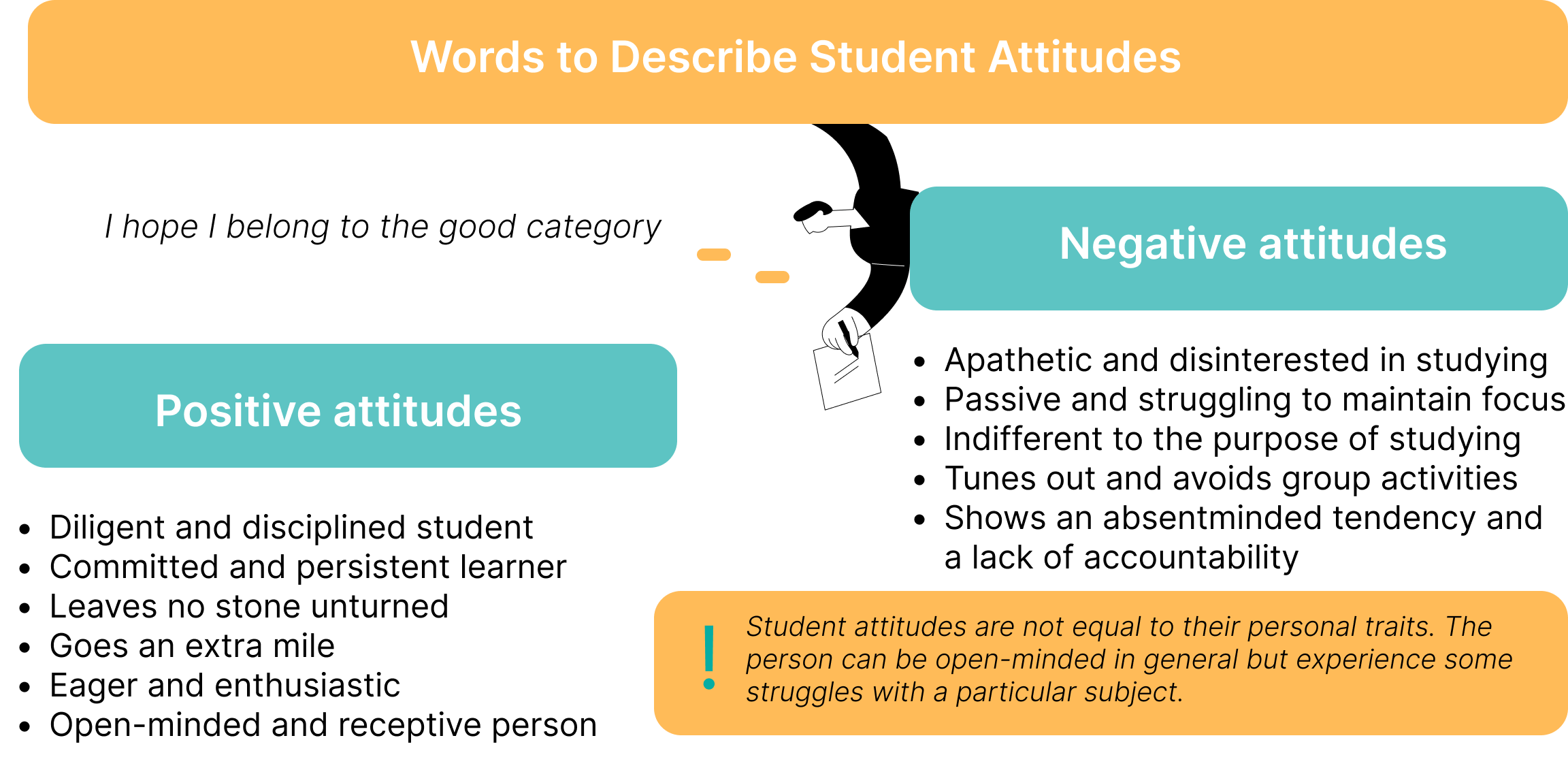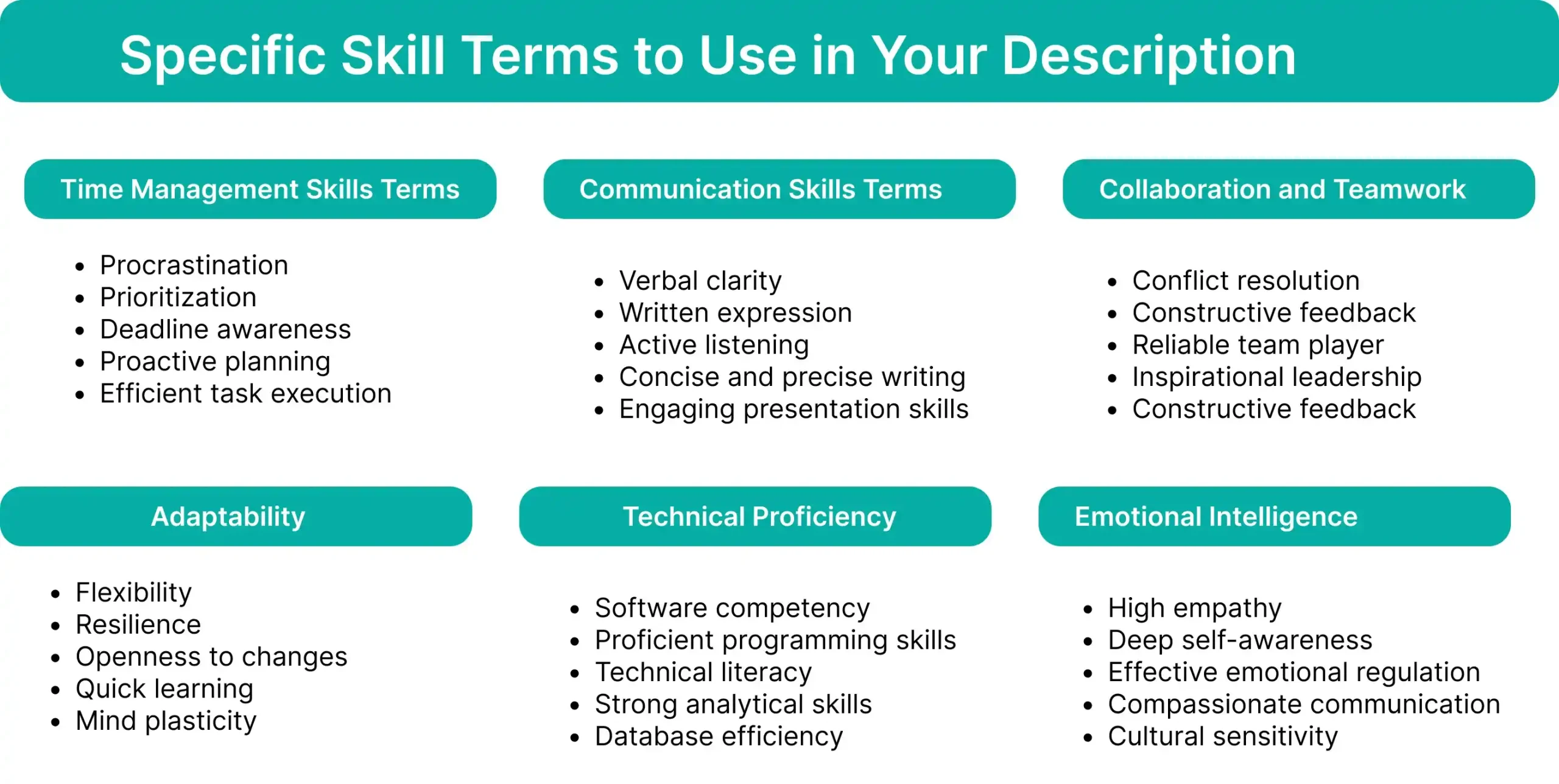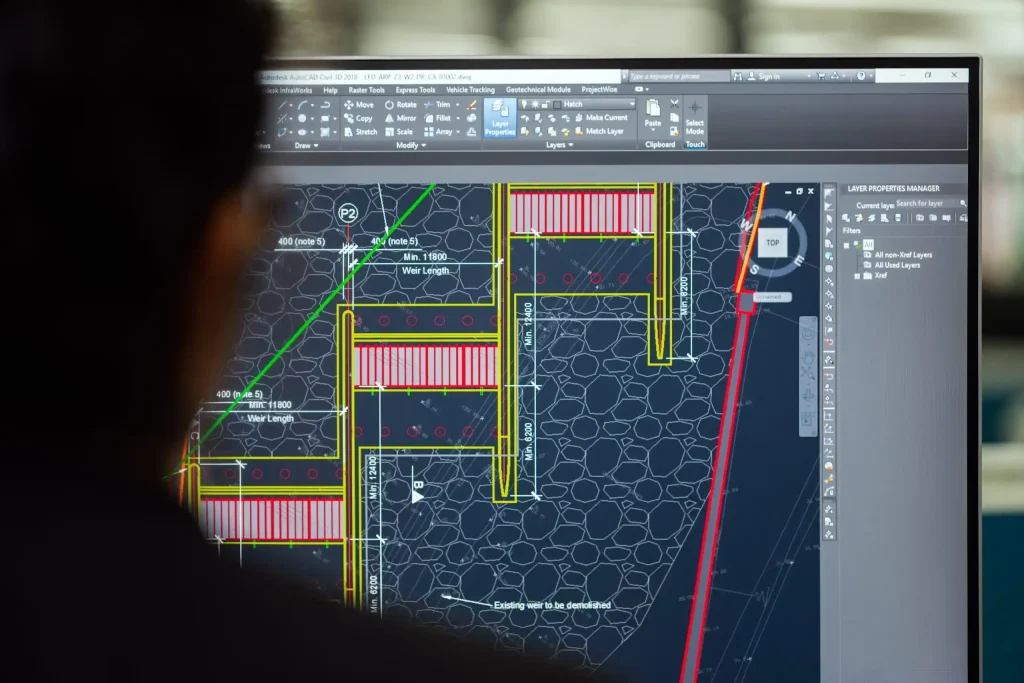Searching for report card language or writing your college admission letter are tedious tasks. We all know the words when we see them written somewhere, but for some reason, we cannot remember them when needed. Is it a regular case for you, too? If the answer is yes, here are the grand lists of words to describe a student academically for all possible life situations.
For personalized assistance in crafting impactful academic descriptions, consider utilizing our assignment writing service.
Assessing Academic Abilities: Skill Evaluation Words and Subject-Specific Descriptions
First of all, each student has a different set of academic abilities. One may be talented in mathematics, and the other strives for social studies. Here are some words for student evaluation based on their strengths.
Words reflecting diverse academic strengths
If the student has solid critical thinking and analysis skills, you can describe them as:
- A person with an excellent conceptual grasp. David has an excellent conceptual grasp. He easily understands complicated formulas like it’s a child’s play for him.
- A solution-oriented student. Carol is a proficient, solution-oriented student. Her idea of fixing up the telescope lenses still keeps the professor impressed.
- A prospective researcher. Mark is definitely a prospective researcher with a bright career path.
If you need to describe some positive traits in mathematics and science, here are a few samples:
- Skilled in experimental designing. James is well-skilled in experimental design. His mind sees a few steps ahead of the process.
- An adept. Kevin is remarkably adept in science. He has a keen understanding of scientific principles.
- Sees the bigger picture. One can say that Mary has a helicopter view of science. She sees the bigger, beautiful picture behind the formulas and numbers.
If the student’s academic strengths concern literature and creative arts, try using these phrases:
- Well-spoken. Daniel is well-spoken and exhibits a good understanding of literary devices and concepts.
- Has a vivid visual imagination. Lily is remarkable for having a vivid visual imagination. When she speaks about the reading, it is easy to believe she has seen the events herself.
- A bright mind. Emma is one of the brightest minds in the class. Her analyses of the poems are fascinating and entertaining.
If you are looking for appropriate feedback words reflecting the nature of cultural studies, try using these options:
- A compassionate heart. Lucy has such a compassionate heart, she finds the right words for everyone who needs her.
- An empathetic listener. Laura proved to be an empathetic listener. Her performance in the clinic was outstanding.
- Well-skilled in connecting and empowering people. Ashley has solid skills in connecting and empowering people. He will make a good social worker.
| HANDPICKED RELATED CONTENT: Nursing School Recommendation Letter How to Review a Book Chapter |
Words you will need for evaluating the academic level
Student evaluation usually requires constructive feedback on the level of academic abilities and achievements. So, instead of the traditional “excellent, good, average, fail” grading system, you can use more diversified evaluation descriptions.
Good academic performance:
- A quick learner. Jefferey is a very quick learner; he is a few chapters ahead of our curriculum.
- Sharp as a tack. Nicole’s mind is sharp as a tack. She completes her assignments almost at light speed.
- Top of the class. Jacob is at the top of the class in academic performance. His learning style is quite efficient and self-motivation-driven.
Average academic performance:
- Meets the baseline. John’s performance this year meets the baseline of the school’s expectations. His improvement areas for the next term must include time management, writing skills, and biology class.
- Satisfactory. Anna shows satisfactory results for most subjects. I believe she will strive for even more sufficient results soon.
- Acceptable. James’ productivity has been acceptable this year. Although there is some room for improvement, he shows better results compared to last year.
Poor academic performance:
- Struggling. Unfortunately, Jean has been struggling a lot recently with learning the basic curriculum.
- Below the bar. John’s work is below the bar of what is expected of a student. However, we believe in student growth and work for the improvement of his skills.
- Deficient. Jack demonstrated a deficient quality of work recently. We believe the reason is his learning styles and sometimes his attitude to teachers.
Describing Student Attitudes: Positive and Negative
Student attitudes toward studying are sometimes more valued than their academic abilities or personal traits. The reason for that is quite straightforward: student growth depends more on the desire to learn than on predispositions to it. Here are some words to help you describe both positive and negative student attitudes to learning:

Words for Positive Academic Traits
Words to describe student academic performance are commonly used for college recommendation letters or annual evaluations. You may also need them for description and narrative essays. To enhance your writing by, consider exploring our curated list. So, regardless of your reasons, grab these examples for positive academic traits:
Language for report cards and evaluations
- A go-getter. Mike is always proactive and ambitious; he is such a go-getter.
- Aspiring. Alice has an aspiring personality. She builds her personality and career all by herself.
- Tenacious. Laura’s work is quite tenacious. She holds her focus rather firmly and stays gathered through all academic challenges.
- Determined. Jerry is a determined student with an amazingly unwavering commitment to his studies.
- Resourceful. Alexis proves to be a resourceful individual. She has kept her performance consistent throughout the whole academic period.
- Ingenious. Lori’s ingenious approach has solid scientific potential. I believe her inventive mind will serve science well.
- Inventive. All applicants this year showed a more inventive approach to admission essays. The committee believes it has to do with generation shifts.
Balancing praise and constructive feedback correctly
If you need some words to describe student with great academically-based performance but also must keep it discreet, we have some inspiration for you.
“This promising student…
- Has a foundation to build upon.
- Has a learning mindset.
- Has a solid potential for improvement.
- Is responsive to guidance and support
- Has a firm code of ethics.
- Has a proactive approach to learning.”
Alternatively, you can praise the results of the student’s work instead of emphasizing the student’s characteristics. For example:
“The student…
- Wrote an excellent essay.
- Demonstrated a nuanced understanding of the plot.
- Performed an insightful historical analysis, clearly demonstrating the causal relations between events.
- Achieved high marks in sociology.
- Demonstrated solid artistic skills.”
If you want to emphasize achievements, it’s better to describe the results of the work and avoid declarations about personal traits. This rule works especially well for work applications. Moreover, in working with children, psychologists say it is better to praise the child’s results of work rather than personality.
Encouraging growth and development: How do you be polite?
If the situation requires you to be polite and still point out some areas for improvement, you can balance between the two. The acknowledgment of the power of words is useful in many more situations than we give credit for. The language can encourage student growth and development by showing their potential and strengths.
For instance, if you want to be polite and considerate of your phrasing, you can say, “The student…
- Must explore new horizons.
- Has yet to discover the hidden potential.
- Has to keep an eye on the prize for better performance.
- Is a great and creative dreamer who will also benefit from keeping his/her feet on the ground.”
Terms for Areas of Improvement. Use Specific Terms for Your Evaluations
One common problem people face when describing something is the lack of accuracy. You may have the characteristic on the top of your tongue but cannot put your finger on it. If that is your problem, here are some specific terms to evaluate in your description:

For example, if you want to use any of them, you can write, “The student:
- Has to enhance analytical skills.
- Needs to foster critical thinking.
- Needs to focus on effective task distribution.
- Must improve time prioritizing.
- Has to work on meeting deadlines more consistently.”
For students excelling in technical fields, our Computer science offer specialized support to enhance their academic journey.
Understanding Different Learning Styles: What Are They?
As you probably know, people perceive information differently, depending on their congenital or acquired learning style. Some students learn better when dealing with written text, and some operate audio playlists more efficiently. You may need to specify that when discussing your terms of work with a new employer or for effective communication with teachers. Anyway, here are some examples with style explanations.
For describing diverse learning styles, it is most useful to use specific perception-based terms. For instance, you can focus on five basic human perception senses and then diversify them with cognitive function descriptions (imagination, memory, attention, decision-making, etc.).
Words to describe different perception styles
- Demonstrates strong visual perception. The person who learns better when reading the text or seeing the concepts in pictures and schemes.
- Auditory-driven learning style. The person with an auditory learning style prefers to hear the explanations in person rather than reading.
- An analytical mind. A student has an analytical mind if they can easily deal with causal relations and large data volumes.
- Intuitive student. An intuitive student sees the backbone of any concept without any explanation or guidance.
- An adaptive learner. You are an adaptive learner if you can switch between learning styles or study in a rapidly changing environment.
- A detail-oriented studying approach. A student with a detail-oriented approach needs to notice all the nuances and will not be satisfied with brief or superficial explanations.
- Connects the dots easily. This phrase describes the person who sees causal relations between concepts.
- Thinks outside the box. This is an alternative phrase to describe creative students.
FAQ: The Ultimate Facts to Know about Student Academic Descriptions
1. How can I describe a student’s academic abilities?
To describe a student’s academic abilities, take time to think of the student’s personality and performance. Write down all basic characteristics you noticed, and then use this article to specify them.
2. What words reflect positive student attitudes?
There are many such words. For example, you can use words like “diligent,” “proactive,” “positive-minded,” “eager to learn,” and “collaborative.”
3. How do I balance praise and constructive feedback in evaluations?
To balance between praise and a constructive attitude, you can concentrate on particular student achievements instead of vague personal characteristics. For example, praise specific well-done tasks and emphasize what qualities are highly valued for this type of assignment.





